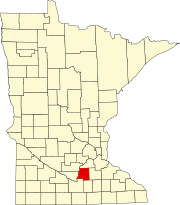Elysian, Minnesota
Elysian, Minnesota | |
|---|---|
 Downtown Elysian | |
 Location Elysian | |
| Country | United States |
| State | Minnesota |
| Counties | Le Sueur, Waseca |
| Government | |
| • Type | Mayor – Council |
| Area | |
• Total | 1.21 sq mi (3.13 km2) |
| • Land | 1.18 sq mi (3.06 km2) |
| • Water | 0.03 sq mi (0.08 km2) |
| Elevation | 1,040 ft (317 m) |
| Population | |
• Total | 652 |
• Estimate (2012[3]) | 654 |
| • Density | 552.5/sq mi (213.3/km2) |
| Time zone | UTC-6 (Central (CST)) |
| • Summer (DST) | UTC-5 (CDT) |
| ZIP code | 56028 |
| Area code | 507 |
| FIPS code | 27-19160[4] |
| GNIS feature ID | 0643325[5] |
Elysian is a city in Le Sueur and Waseca counties in the U.S. state of Minnesota. The population was 652 at the 2010 census.[6] The city is distinct from Elysian Township.
History
Elysian was platted in 1856, and named for Elysium in Greek mythology.[7] Elysian was incorporated in 1884.[7]
Geography
According to the United States Census Bureau, the city has a total area of 1.21 square miles (3.13 km2); 1.18 square miles (3.06 km2) is land and 0.03 square miles (0.08 km2) is water.[1]
Minnesota Highway 60 serves as a main route in the community.
Demographics

| Census | Pop. | Note | %± |
|---|---|---|---|
| 1880 | 167 | — | |
| 1890 | 348 | 108.4% | |
| 1900 | 459 | 31.9% | |
| 1910 | 345 | −24.8% | |
| 1920 | 354 | 2.6% | |
| 1930 | 388 | 9.6% | |
| 1940 | 382 | −1.5% | |
| 1950 | 402 | 5.2% | |
| 1960 | 382 | −5.0% | |
| 1970 | 445 | 16.5% | |
| 1980 | 454 | 2.0% | |
| 1990 | 445 | −2.0% | |
| 2000 | 486 | 9.2% | |
| 2010 | 652 | 34.2% | |
| 2015 (est.) | 669 | [8] | 2.6% |
| U.S. Decennial Census | |||
2010 census
As of the census[2] of 2010, there were 652 people, 273 households, and 181 families residing in the city. The population density was 552.5 inhabitants per square mile (213.3/km2). There were 372 housing units at an average density of 315.3 per square mile (121.7/km2). The racial makeup of the city was 96.6% White, 0.5% African American, 0.2% Asian, and 2.8% from two or more races. Hispanic or Latino of any race were 0.9% of the population.
There were 273 households of which 26.7% had children under the age of 18 living with them, 56.8% were married couples living together, 5.1% had a female householder with no husband present, 4.4% had a male householder with no wife present, and 33.7% were non-families. 27.8% of all households were made up of individuals and 13.2% had someone living alone who was 65 years of age or older. The average household size was 2.37 and the average family size was 2.84.
The median age in the city was 43.4 years. 23.6% of residents were under the age of 18; 4.9% were between the ages of 18 and 24; 23.9% were from 25 to 44; 28.4% were from 45 to 64; and 19.2% were 65 years of age or older. The gender makeup of the city was 49.4% male and 50.6% female.
2000 census
As of the census[9] of 2000, there were 486 people, 204 households, and 127 families residing in the city. The population density was 551.3 per square mile (213.2/km²). There were 276 housing units at an average density of 313.1 per square mile (121.1/km²). The racial makeup of the city was 99.38% White, 0.21% from other races, and 0.41% from two or more races. Hispanic or Latino of any race were 0.82% of the population.
There were 204 households out of which 27.9% had children under the age of 18 living with them, 53.9% were married couples living together, 5.4% had a female householder with no husband present, and 37.3% were non-families. 29.9% of all households were made up of individuals and 15.2% had someone living alone who was 65 years of age or older. The average household size was 2.38 and the average family size was 2.95.
In the city the population was spread out with 23.7% under the age of 18, 8.0% from 18 to 24, 29.4% from 25 to 44, 23.7% from 45 to 64, and 15.2% who were 65 years of age or older. The median age was 38 years. For every 100 females there were 95.2 males. For every 100 females age 18 and over, there were 92.2 males.
References
- ^ a b "US Gazetteer files 2010". United States Census Bureau. Retrieved 2012-11-13.
- ^ a b "American FactFinder". United States Census Bureau. Retrieved 2012-11-13.
- ^ "Population Estimates". United States Census Bureau. Retrieved 2013-05-28.
- ^ "American FactFinder". United States Census Bureau. Retrieved 2008-01-31.
- ^ "US Board on Geographic Names". United States Geological Survey. 2007-10-25. Retrieved 2008-01-31.
- ^ "2010 Census Redistricting Data (Public Law 94-171) Summary File". American FactFinder. United States Census Bureau. Retrieved 27 April 2011.
- ^ a b Upham, Warren (1920). Minnesota Geographic Names: Their Origin and Historic Significance. Minnesota Historical Society. p. 301.
- ^ "Annual Estimates of the Resident Population for Incorporated Places: April 1, 2010 to July 1, 2015". Retrieved July 2, 2016.
- ^ "Find a County". National Association of Counties. Retrieved 2011-06-07.


